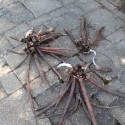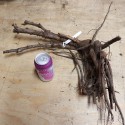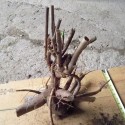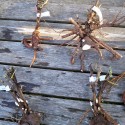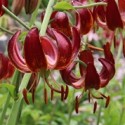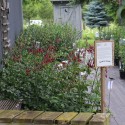About the Plants We Sell
True to Name, Disease Free, Premium Quality Field Grown plants
Herbaceous Paeonia | Intersectional Paeonia |Woody Paeonia | Lilium
Solaris Farms grows, digs, processes and ships the plants we offer in open field conditions, without special seasonal protection or care. We typically do not provide extra water, fertilizer or other growing enhancements for our plants. Conditions can be quite adverse in our fields, but the resulting trialed and selected plants are more likely to provide excellent subjects for northern tier gardens than greenhouse propagated cultivars, or those resold from other growers. Our customers know we ship only PREMIUM QUALITY plants compared to other sources. You can expect superior planting material for your garden. As a specialty nursery we know our plants well and believe this is revealed in our products (premium quality plants). See below for specific information about our product sizes and characteristics at the time of shipping or farm purchase.
Herbaceous Paeonia (Garden Peony)
We guarantee correctly named, disease free cultivars! Herbaceous peonies are harvested in the fall of the year and this is the only time that we ship. The roots we send are divisions from larger plants, which are dug and divided in the season they are shipped (fall). Our divisions have 3 to 5 eyes or more with a root system that will support healthy growth the following year. Some peony cultivars do not yield 3 eye divisions, not unusual with some of the hybrids and species which produce irregular crowns. In any case, they will be clean healthy divisions that will prosper in your garden. Our root divisions are carefully proportioned, so attached roots can support the number of eyes. The major concern we have is a healthy division that will establish and be productive in your garden, not large size (which means little with herbaceous peonies). We do not sell micro-propagated plants, only originators stock. Viral diseases have become a common problem in the peony industry and our fields are carefully inspected by the USDA and our own personnel to confirm our plants are disease free. Our plants are not cooler stored prior to shipping which insures plants remain dormant and do not begin growth out of the climate cycle (in normal conditions). See our Culture and Care page for further information. All herbaceous peonies are shipped in last week of September to mid-October, the correct time to plant peonies in most localities. Spring planting should be avoided, as peonies do not produce roots in warming soils and generally more negative planting results occur (thus we do not sell peonies in spring).
Intersectional Paeonia (Itoh Peony)
Intersectional peony roots, like their herbaceous relatives, are harvested in the fall and are only shipped at this time. Again, only originators stock is sold by Solaris Farms; no micro-propagated plants! We guarantee correctly named, disease free cultivars! Intersectional divisions can be quite far ranging in size and configuration. Because of their rather unusual pedigree (herbaceous x woody), the root structure is a combination of woody and herbaceous tissue. The divisions we sell are from larger clumps that are divided. Division often requires that we saw plants into pieces. All growers do this and the plants respond quite well to this type of treatment. Most stem tissue is cut away, leaving only roots and colorful eyes. You can expect 3 to 5 eyes or more on a supporting healthy root. See our Culture and Care page for further information. All intersectional peonies are shipped in last week of September to mid-October, the correct time to plant peonies in most localities. Spring planting should be avoided, as peonies do not produce roots in warming soils and generally more negative planting results occur (thus we do not sell peonies in spring).
Woody Paeonia (Tree/Shrub Peony)
We guarantee correctly named, disease free cultivars! Solaris Farms supplies high quality woody peony plants. All grafted plants are are joined to non-adventitious root stock, which means they will not produce herbaceous peony suckers, which are problematic with many other sourced woody peonies. Divisions may be shipped in instances which larger plants in our field are divisible. Divisions are often irregular in form and may require addtional time (cultivar specific) to establish in northern gardens. Additionally, all plants are propagated and grown at our farm (we are not resellers). Read more below…
About 3+ year field grown woody peonies. Plants of this age will be anywhere from 3 to 7 years in age and will have a well developed root system which may be their own roots, but may also include larger grafted plants and divisions. The 3+ year plants we offer are sturdy field grown individuals harvested from our very own fields and have more mass than what is available from other nurseries. If grafted, the nurse roots may be trimmed away if sufficient own roots have grown. Some grafted plants may be divided due to their large size and these may have broad cut faces on the nurse roots – no worries this configuration will grow as well as other configurations. Stems will also be trimmed back for shipping to insure proper proportion for re-establishment. These plants are flowering size, have bloomed previously and often bloom the year after planting, but may take an additional year or two to settle in . No herbaceous root suckering is guaranteed on our grafted plants, as we use non-adventitious root stock, which is unique to our propagation program.
Stems are trimmed back for shipping and planting. Most of a woody tree peony’s energy lies within its crown and root system. By partially removing stems the plants more easily establish in a new garden. After planting in the garden, plants readily grow new roots and produce commensurate stem growth the following year. Without partial removal of older stems, plants often flounder for a number of years and are less productive. This practice is used on all of our own transplants and is the only way we will ship them. Plants are marked with a ‘tie’ to indicate planting depth. See our Culture and Care page for further information or the News and Articles sections for further information about planting, care and types of woody peonies.
Cultivar selection is something we take pride in! Solaris Farms grows thousands of named cultivars and unregistered seedlings, of which many will never see our pricelists (for many reasons). Additionally, we cull (remove/destroy) inferior cultivars and seedlings which do not meet expectations or show a lack of performance in our gardens. We do not sell particularly difficult to grow cultivars, or those which are not well suited for most American gardens. Commonly available Chinese Suffruticosa Group cultivars are not in our listings for a reason – these plants produce beautiful flowers, but are unable to adapt to continental climates and only cause challenges in most American gardens. While not all plants in our collection and offerings are of equal vigor, they do meet our requirements to become beautiful plants over time with a minimum of challenges. Additionally, our offering selections focus on overall amount, presentation, consistency, and uniqueness of bloom. All said, we’d like to give our customers the best chance at a cultivar(s) which will grow well in their gardens.
All woody peonies are shipped in last week of September to mid-October, the correct time to plant peonies in most localities. Spring planting should be avoided, as peonies do not produce roots in warming soils and generally more negative planting results occur (thus we do not sell peonies in spring).
Lilium (True Lilies)
Lilies are shipped as dormant bulbs in mid October. Our lilies are disease and pest free. Our offerings are of premium size, grown in our fields and will be sure to please. Unlike many Lily suppliers, we do not resell bulbs directly from a wholesale source. Instead, large mature bulbs are harvested from our own growing areas after they have achieved the size our customers would most like to grow. Mid October is the preferred planting time in most locations, thus they are shipped during this period. We grow a limited number of each cultivar, which allows us to concentrate on quality over quantity. Many Asiatic cultivars and some Martagon cultivars produce small mature bulbs, but will produce outstanding results. See our Culture and Care page for further information. Plan a shopping trip during the summer months to Solaris Farms-you won’t be disappointed. Please note that lilies are quite attractive to deer, rabbits and other herbivores, thus may not be suitable additions to all gardens. Additionally, the insect pest, the Lily Beetle, is finding its way into gardens across North America, making these beautiful plants more challenging to grow in affected areas. Our bulbs are washed, disinfected and inspected to assure no pests, or diseases are present.

